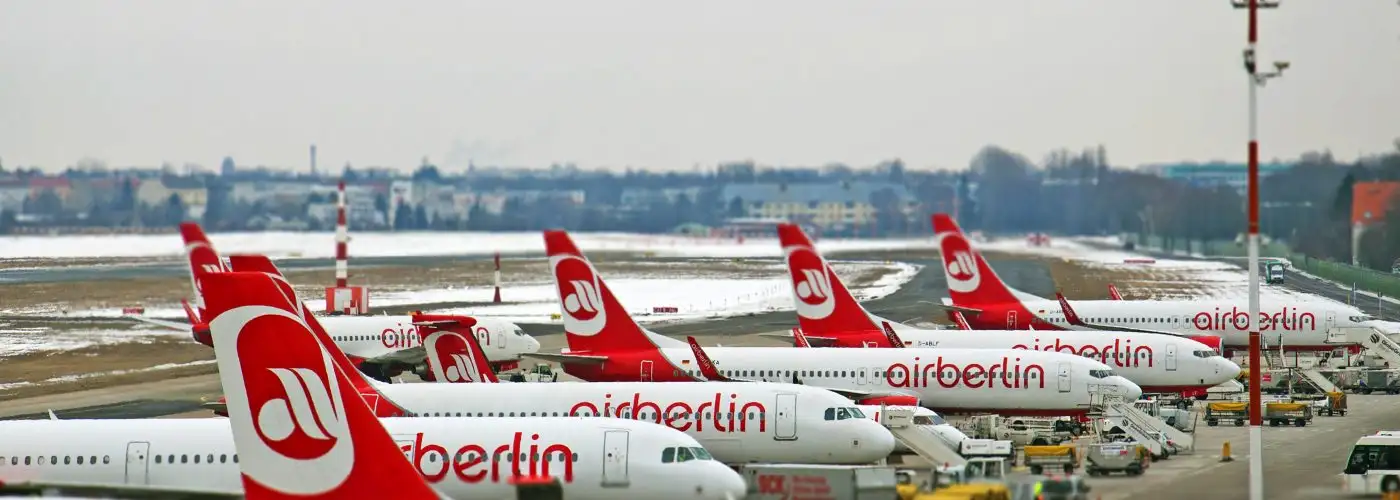German low-cost carrier Air Berlin filed for bankruptcy earlier this week, after one of it’s largest investors, Etihad Airlines, declined to finance a business-saving bailout.
Air Berlin carries more than two million passengers per year, but struggled amidst intense competition from rival carriers in the Europe market. The airline has European hubs in the eponymous German capital, as well as Dusseldorf.
For travelers booked on Air Berlin, nothing will change in the short term. The German government gave the airline a temporary loan, which allows the airline to be sold or restructured over the next three months. According to ABC News, Germany usually forces airlines to ground planes following a bankruptcy filing, but Chancellor Angela Merkel feared doing so would strand travelers already on vacation. Lufthansa may look to purchase part or all of the carrier.
It’s too early to say what will happen to Air Berlin’s routes between the U.S. and Europe. Travel Weekly reports that if Lufthansa does acquire Air Berlin in some capacity, it could choose to maintain some routes and operate them through its own low-cost carrier, Eurowings. Air Berlin only flies direct to Dusseldorf and Berlin from the U.S., but offers connecting flights to other European destinations. Eurowings currently connects in Cologne from a handful of U.S. cities. It could also scrap the routes and deploy Air Berlin’s aircraft elsewhere. Either way, the Air Berlin brand will likely cease.
On a larger scale, a bankruptcy like this is significant. Air Berlin is popular—it’s the second largest carrier in Germany, behind Lufthansa, and the sixth largest in Europe. I personally know many people who flew the airline and either enjoyed it, or at least got a good deal on airfare. It seems to have had solid financial backing until now: On paper, it probably should have been successful. But, the low-cost space in Europe is more crowded than ever, with mainstays Ryanair and EasyJet fending off newcomers such as WOW, and Norwegian, among others.
All this competition is ultimately good for travelers. These days, there are many affordable, accommodating options for transatlantic travel. But, Air Berlin’s fate highlights the challenge of achieving and maintaining profitability, and uncertainly that is inherent in such a competitive market.
More from SmarterTravel:
- Norwegian Air Expands to Chicago, Austin for Transatlantic Flights
- What Do Spirit and WOW Air Have in Common?
- Ryanair’s New Leisure Fares Come with Extra Perks
We hand-pick everything we recommend and select items through testing and reviews. Some products are sent to us free of charge with no incentive to offer a favorable review. We offer our unbiased opinions and do not accept compensation to review products. All items are in stock and prices are accurate at the time of publication. If you buy something through our links, we may earn a commission.
Related
Top Fares From
Today's Top Travel Deals
Brought to you by ShermansTravel
France: 8-Night Paris, Avignon & Nice...
Infinity Worldwide Vacations
 vacation
$2880+
vacation
$2880+
Poconos: 3 Nts in Garden of...
ResortsAndLodges.com
 hotel
$305+
hotel
$305+
7-Nt Canada & New England Cruise,...
Princess Cruises
 cruise
$839+
cruise
$839+




